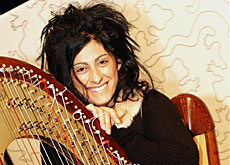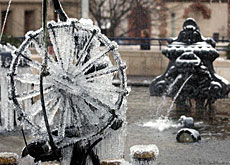Award-winning artist challenges expectations

Artist Mona Hatoum plays with our expectations, turning innocuous objects such as wheelchairs into dangerous threats.
At 52, Hatoum has just won Switzerland’s Roswitha Haftmann Prize of SFr120,000 ($103,000), making her the youngest-ever recipient.
“There is an undertone of malevolence that disturbs expectations,” the artist told swissinfo.
“I want people to question the things around them.”
“Home” in Hatoum’s works is not a place of peace and shelter. In much of her work – which includes sculpture, video, installations and photography – the innocuous turns dangerous.
The carpet is a bed of nails. The birdcage is the size of an Alcatraz prison cell. Wheelchair handgrips are razor sharp knives.
“The vulnerable person resents his dependence on the caregiver. He is biting the hand that feeds him,” she explained.
No place like home
London-based Hatoum was raised in Beirut but stranded in London when war broke out in her homeland in 1975. The ensuing struggle for home and identity have characterised her work.
La Grand Broyeuse is an 18-foot reproduction of an early hand-operated food processor, more an instrument of torture than a kitchen tool.
“You can interpret that struggle for home as the plight of the refugee but it can also refer to women feeling subjugated by domesticity. Or it can be about everyday trauma,” she said.
In one of Hatoum’s favourite pieces, Grater Divide, the innocuous cheese grater is enlarged and re-made as a cutting-edge, Victorian room divider.
When she finished it, she discovered that it also said something, to her, about privacy.
The design, “was a reference to the wooden-slatted partitions typical of Arab homes – the architectural equivalent of the veil”, she said.
In contrast, Corps Etranger is a video scouring the interior landscape of her own body, which she filmed by swallowing the camera. It makes a statement about a lack of privacy.
“In the west, there’s not one corner of our lives that is not open to scrutiny,” she said.
The mirror
She hopes people will find their own meanings.
A crib in which wires replace a mattress suggests child abuse to some and the yoke of parenting to others. “It becomes a mirror of their own experience.”
Hatoum says that winning the Roswitha Haftmann Prize exceeded any expectation she had when, from early childhood, she began preparing for life as a struggling artist. “Whenever something like this happens, I can’t believe it.”
The prize, funded by the Roswitha Haftmann Foundation in Zurich, is Europe’s highest monetary award and is meant for lesser-known artists still living.
Award spokesman Björn Quellenberg said Hatoum “plays with our expectations”, adding layers of meaning through materials and design.
“Mona is not very well known, but she is someone to be discovered.”
swissinfo, Elizabeth Meen
Roswitha Haftmann, who died in 1998, was a Swiss language teacher who ran her own art gallery in Zurich.
She set up a foundation to fund the Roswitha Haftmann Prize, SFr120,000, given every 1-3 years to a lesser-known artist, still living.
This year’s jury included representives of Swiss museums in Bern, Basel and Zurich.
Previous winners: Walter de Maria, Maria Lassnig and Jeff Wall.
Prize-winning artist Mona Hatoum was born in Beirut in 1952. One of three daughters, she was encouraged to be independent and follow her dreams.
She attended London’s Slade School of Art (1975-1979) before exploring video, sculpture and installations.
Her works suggest alienation, vulnerability, and the danger that lurks in what we think is safe.

In compliance with the JTI standards
More: SWI swissinfo.ch certified by the Journalism Trust Initiative


You can find an overview of ongoing debates with our journalists here. Please join us!
If you want to start a conversation about a topic raised in this article or want to report factual errors, email us at english@swissinfo.ch.